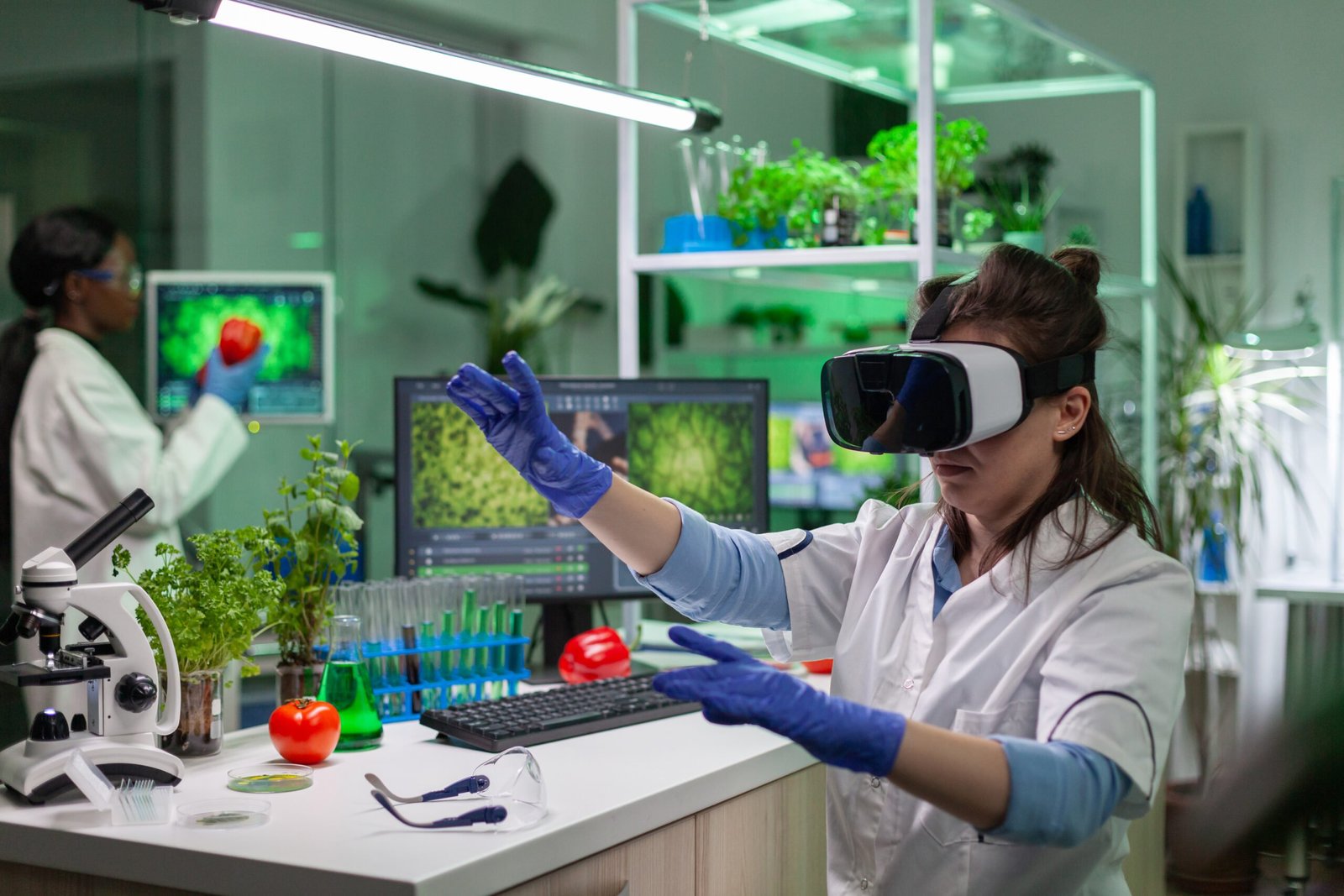Biotechnology Innovations: Shaping Tomorrow’s Science
Biotechnology Innovations: Shaping the Future of Science

Introduction:
Biotechnology has emerged as one of the most dynamic and influential fields of science in the 21st century. With its roots in genetic engineering, it has expanded to encompass a plethora of interdisciplinary approaches that promise to revolutionize medicine, agriculture, and environmental management. This article delves into the key innovations in biotechnology, exploring their impact on science and society.
CRISPR and Gene Editing
The Revolutionary Tool
CRISPR-Cas9, often referred to simply as CRISPR, is a groundbreaking technology in the field of gene editing. This system allows scientists to make precise, directed changes to the DNA of living organisms. The simplicity and efficiency of CRISPR have made it a preferred tool for genetic engineering since its discovery in 2012. Researchers have utilized CRISPR to correct genetic defects, enhance crop resilience, and even alter the DNA of embryos.
Applications in Medicine
CRISPR’s most notable impact is seen in medicine. This gene-editing technology is being used to develop treatments for genetic disorders such as cystic fibrosis, Huntington’s disease, and sickle cell anemia. Clinical trials are underway to determine the safety and efficacy of CRISPR-based therapies, with some promising early results. The potential to cure previously untreatable diseases has propelled CRISPR to the forefront of medical research source.
Ethical Considerations
However, the power of CRISPR also raises significant ethical concerns. The ability to edit human embryos and the prospect of “designer babies” have sparked debates about the moral implications of gene editing. Regulatory bodies worldwide are grappling with creating frameworks that allow scientific progress while preventing misuse. The balance between innovation and ethical responsibility remains a critical discussion point in the field source.
Synthetic Biology
Engineering Life
Synthetic biology combines biology and engineering to design and construct new biological parts, devices, and systems. It extends beyond traditional genetic engineering by enabling the creation of entirely new organisms with novel functions. This interdisciplinary field has seen remarkable growth over the past decade, with applications ranging from biofuels to custom-designed microorganisms source.
Biofuels and Sustainability
One of the most promising applications of synthetic biology lies in the development of sustainable biofuels. By engineering microorganisms to efficiently produce biofuels from renewable resources, scientists hope to reduce dependence on fossil fuels and lower greenhouse gas emissions. Such innovations could play a crucial role in addressing the global energy crisis and combating climate change source.
Health and Medicine
In the realm of healthcare, synthetic biology has paved the way for advances in diagnostics and therapeutics. Researchers are developing synthetic gene circuits that can detect and respond to disease conditions within the body. These biological systems could lead to highly personalized and effective treatments, revolutionizing the way we approach complex diseases source.
Agricultural Biotechnology
Enhancing Crop Productivity
Agricultural biotechnology has made significant strides in improving crop yields and resilience. Through genetic modification, scientists have developed crops that are resistant to pests, diseases, and extreme environmental conditions. These advancements not only enhance food security but also reduce the need for chemical pesticides, thereby promoting a more sustainable agricultural practice source.
Nutritional Improvements
Beyond yield enhancement, biotechnology is also used to improve the nutritional content of crops. For instance, Golden Rice has been engineered to contain higher levels of Vitamin A, addressing deficiencies in populations that rely heavily on rice as a staple food. Such biofortified crops have the potential to combat malnutrition and improve public health on a global scale source.
Environmental Impact
The environmental benefits of agricultural biotechnology cannot be overstated. Genetically modified crops that require fewer inputs such as water and fertilizers contribute to more sustainable farming practices. Additionally, crops engineered for pest resistance reduce the environmental impact of agriculture by lowering the need for chemical interventions, thereby preserving biodiversity and soil health source.
Biopharmaceuticals
The Rise of Biopharmaceuticals
Biopharmaceuticals, or biologics, represent a rapidly growing sector in the pharmaceutical industry. These products are derived from living organisms and include a variety of treatments such as monoclonal antibodies, vaccines, and gene therapies. The complexity and specificity of biologics offer advantages over traditional small-molecule drugs, particularly in treating chronic and complex diseases source.
Cancer Treatment
One of the most significant impacts of biopharmaceuticals is in the field of oncology. Monoclonal antibodies and immune checkpoint inhibitors have revolutionized cancer treatment, offering new hope to patients with previously untreatable cancers. These therapies work by targeting specific molecules within cancer cells, thereby minimizing damage to healthy tissue and improving treatment outcomes source.
Challenges and Future Directions
Despite their promise, biopharmaceuticals face several challenges, including high production costs and complex regulatory pathways. Advances in biotechnology, such as cell-line engineering and bioprocess optimization, aim to address these issues by making biologic production more efficient and cost-effective. As the field continues to evolve, the integration of biopharmaceuticals into mainstream medicine is expected to expand, offering new treatment paradigms for a variety of diseases source.
Conclusion:
Biotechnology is transforming the landscape of science and medicine in unprecedented ways. From gene editing and synthetic biology to agricultural advancements and biopharmaceuticals, the innovations in this field are driving progress and offering solutions to some of the most pressing challenges of our time. However, with great power comes great responsibility, and ethical considerations must guide the continued development and application of these technologies. As we look to the future, the potential of biotechnology to improve human health, enhance food security, and protect the environment is both exciting and profound.
Key Takeaways:
- CRISPR-Cas9: A revolutionary gene-editing tool with applications in medicine and agriculture.
- Synthetic Biology: Combines biology and engineering to create new organisms and biological systems.
- Agricultural Biotechnology: Enhances crop productivity, nutritional content, and environmental sustainability.
- Biopharmaceuticals: Advanced treatments derived from living organisms, revolutionizing disease treatment.
FAQs
1. What is CRISPR-Cas9?
- CRISPR-Cas9 is a gene-editing technology that allows scientists to make precise changes to the DNA of living organisms.
- It has applications in correcting genetic defects, enhancing crop resilience, and developing new medical treatments.
2. What are the ethical concerns associated with CRISPR?
- Ethical concerns include the potential for creating “designer babies” and editing human embryos.
- Regulatory bodies are working on frameworks to balance scientific progress with ethical considerations.
3. How does synthetic biology differ from traditional genetic engineering?
- Synthetic biology involves designing and constructing new biological parts and systems, often creating entirely new organisms.
- Traditional genetic engineering typically involves modifying existing organisms.
4. What are the potential benefits of synthetic biology in energy production?
- Synthetic biology can help create sustainable biofuels by engineering microorganisms to efficiently convert renewable resources into energy.
- This could reduce reliance on fossil fuels and lower greenhouse gas emissions.
5. How has agricultural biotechnology improved crop yields?
- Through genetic modification, crops have been developed to resist pests, diseases, and extreme environmental conditions.
- This leads to higher productivity and reduced need for chemical pesticides.
6. What are biofortified crops, and why are they important?
- Biofortified crops have been genetically engineered to contain higher levels of essential nutrients, such as Vitamin A in Golden Rice.
- They can address nutritional deficiencies and improve public health, especially in developing countries.
7. What are biopharmaceuticals?
- Biopharmaceuticals are medical products derived from living organisms, including monoclonal antibodies, vaccines, and gene therapies.
- They offer targeted treatments for complex diseases, such as cancer and autoimmune disorders.
8. Why are biopharmaceuticals often more expensive than traditional drugs?
- The production of biopharmaceuticals involves complex processes and high costs.
- Advances in biotechnology aim to make production more efficient and cost-effective.
9. What role do monoclonal antibodies play in cancer treatment?
- Monoclonal antibodies target specific molecules within cancer cells, reducing damage to healthy tissue and improving treatment outcomes.
- They have significantly advanced the field of oncology.
10. What are the future directions for biotechnology?
- Future directions include improving the efficiency and cost-effectiveness of biopharmaceutical production.
- Continued ethical considerations and regulatory frameworks will be crucial as the field progresses.








